#2019 Junior Russian Nationals
Photo
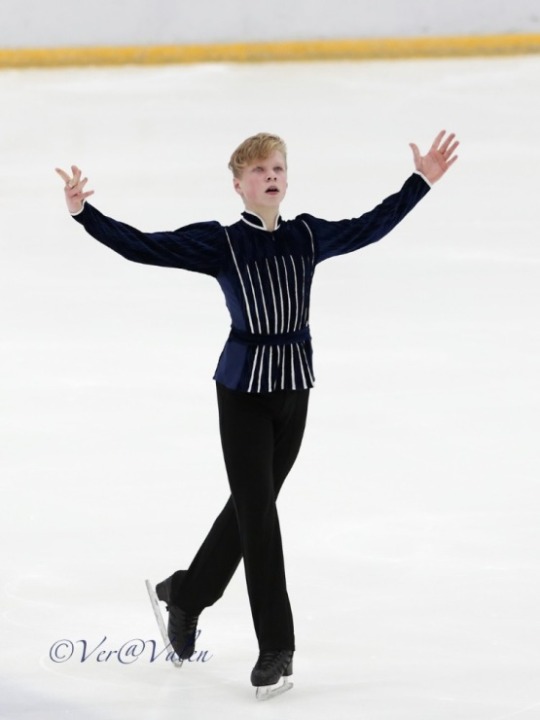
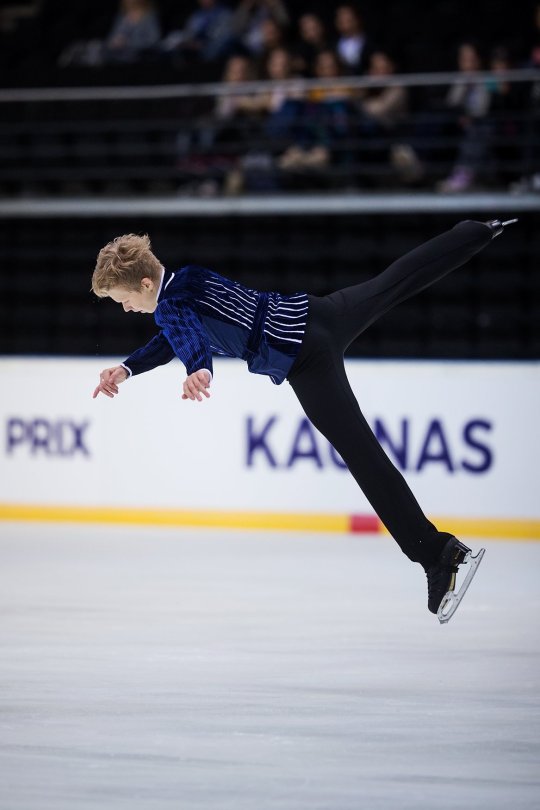
Kirill Iakovlev skating to Nino Rota's Romeo and Juliet for his free program at the 2019 Junior Russian Championships and 2018 Junior Grand Prix Kaunas.
(Sources: 1 and 2)
#Kirill Iakovlev#Romeo and Juliet#Nino Rota#Figure skating#Russia#Men#2018–2019#2018 Junior Grand Prix Kaunas#2019 Junior Russian Nationals
4 notes
·
View notes
Text
youtube
Anastasia Simakova (GER/TSV Schmiden), Clubs, 2023 DTL RSG Bundesliga Finale
Simakova was the 2019 Junior World Champion in Rope. She changed nationalities from Russia to Germany but Russia opposed her change and she's currently sitting out of international competition for one year until March 2024. However she is able to continue competing domestically in the Rhythmic Bundesliga. Irina Viner has not opposed all Russian gymnast country changes and I do not know the story behind why she has opposed Simakova's.
13 notes
·
View notes
Text
american media: its effects on the teenage prodigy
For those who don't know, one of my favorite skaters is Alysa Liu.
Alysa is a 2x US national champion, junior and senior world bronze medalist, and 2022 Olympian.
But, one thing about her is when you look her up, one of the subheadings on her wikipedia is "2021–22 season: International senior debut, Beijing Olympics, World Championships, and retirement".
What happened to her? What was so troubling about the 2021/22 season that caused this all to happen at once, and at the age of 16?
From my limited research but somewhat extensive knowledge, the one thing I can connect this early retirement to is the American media.
Before I start, I just want to preface that I am very glad they retired on their own terms, and not due to injury or something worse. Though I do miss them.
-
Alysa was 13 when she won her first senior national title in January 2019, the youngest female to win US nationals as of today. She defended her title the next year, winning back-to-back nationals at only 14 years old.
Also in the 2019/2020 season, they had their international junior debut. During this, they became the first woman to complete a triple axel and quadruple jump in competition, as well as achieving the status of the first non-Russian girl to win a Grand Prix event for around 20 competitions. They went on to win bronze at the World Junior Championships in March 2020.
This bout of success caused eyes of every American media outlet to be focused on young Alysa. They started deeming her as an American prodigy, the only hope to have an Olympic medal in Ladies' Single Skating at Beijing 2022. This was still two years away from the Winter Olympics, and she was only 14.
The next year, 2021, Alysa underwent a growth spurt, which, obviously, is normal for a 15 year old girl. Because of this, she lost her triple axel and quadruple lutz jumps, causing American media to forget her, or worse, doubt and even berate her. If she can't beat the Russians at the next Olympics, who can? The media gave up hope on her and did not care about the effects of doing so.
Cut to the 2021/2022 season, Alysa's international senior debut. She officially secured the third spot for US ladies at the Olympics, and performed average at her Grand Prix assignments, placing fourth at both. She had to withdraw from US Nationals due to COVID, but still managed to petition for a spot on the 2022 Olympic team thanks to her performance history. Once again, she was America's "only hope" for a spot on that podium.
Overall, she placed 7th, the highest out of the three American female skaters. She claimed she was pleased with her performances, and that she was just happy to be in Beijing. A little over a month later, she won bronze at the 2022 World Championships, being the first American woman to medal since 2016.
Months later, they announced their retirement, and have not (publicly) skated competitively or professionally since.
They also archived all social media.
While other reasons can be argued for this happening, the main one is the pressure put on Alysa at such a young age to be the saving grace of American figure skating.
I know you're wondering, has the media learned and changed?
And as an answer, I will point you in the direction of 18 year old Ilia Malinin, who media has dubbed "heaven-sent for US figure skating", or even tell you to keep an eye on 15 year old Isabeau Levito, "America's new hope".
50 notes
·
View notes
Text
Shortly after his populist far-right Freedom Party made gains in Sunday’s state elections in Salzburg, Herbert Kickl, the party’s leader, struck a triumphant tone. “We’ve succeeded in further strengthening our solidarity with the people,” Kickl said. “The next step, by fall at the latest, is a run for the chancellery and a government under [Freedom Party] leadership.”
That would have been crazy talk a few years ago. But in Austria, time’s arrow always seems to point in one direction.
The Freedom Party of Austria (FPO) has had a tough few years. In the spring of 2019, the FPO was the junior partner in a coalition with the conservative People’s Party (OVP). But that May, German media published a secretly recorded video of then-FPO leader Heinz-Christian Strache on the Spanish island of Ibiza, in which he made shady deals with a woman he believed was the niece of a Russian oligarch. The video and the resulting fallout, known as the “Ibiza affair,” toppled the right-wing government and led to snap elections, in which the FPO lost nearly 10 points and dropped to just 16 percent support among the electorate.
Nearly four years later, it’s as if Ibiza never happened. In Sunday’s vote in Salzburg, the FPO won nearly 26 percent of the vote, gaining nearly 7 percentage points compared with 2018. The People’s Party, meanwhile, the party of current Chancellor Karl Nehammer, went backwards. The Salzburg vote was the latest proof that the FPO has, like an intrepid DJ, shaken off the stank of Ibiza and somehow, once again, come out on top.
It’s not just Salzburg. Back in late January, the FPO won 24 percent of the vote in the region of Lower Austria, a big jump over 2018. And nationally, the FPO is averaging 28 percent in the polls, comfortably ahead of the center-left Social Democrats, which have 23 percent support, and the OVP, with 21 percent. In other words, after years of rebuilding, Austria’s far right has not only regained its previous support but become the country’s dominant political force.
Like its counterparts in countries across Europe, the FPO has weaponized rising inflation and energy prices to increase its support since last fall. It has also capitalized on a range of other domestic political developments, including the unpopularity of the current OVP-Greens government, the relative weakness of the Social Democrats, and a series of scandals within the governing OVP that have made the Ibiza scandal look almost appealing by comparison.
Experts say the far-right party’s efforts to differentiate itself from other parties on the various crises of the past few years—whether the government response to the coronavirus, the economic aftermath of the war in Ukraine, or Austria’s tepid response to Russian aggression—have added wind to its sails and helped the party win back some of its previous voters.
“This is what the Freedom Party has always managed very well: to occupy the position that’s ‘free,” said Peter Hajek, a Vienna-based pollster. “If everyone else is basically in favor of the sanctions against Russia, the [FPO] will go to the opposite side. And that is, of course, the advantage of being a populist, even opportunist, party.”
The FPO has also benefited from the fact that voters have short memories—and, because of scandals and troubles in other major parties, Ibiza feels like a distant memory. After investigators found that former OVP Chancellor Sebastian Kurz and his allies had spent government funds on doctored opinion polling to bolster their political position, Kurz resigned from office in fall 2021. Since then, a steady stream of revelations from the scandal surrounding Kurz and his inner circle have continued to come to light, giving voters the impression that the FPO is the less corrupt party after all.
“A lot has happened in between, and much of it has to do with the weakness of [the FPO’s] opponents,” Hajek said. “After the problems with Sebastian Kurz and his allies, many people of course said, ‘Okay, what the Freedom Party did isn’t actually that bad, the other guys are worse.’”
This, combined with a leadership battle within the Social Democrats that has weakened the party’s image as a viable alternative, has driven a solid section of the voters who supported the OVP after Ibiza back to the FPO. “I think people have really lost trust [in the governing OVP], and a protest vote against ‘those up there’ is always a way out,” said Ruth Wodak, an expert in populist far-right rhetoric who works at the University of Vienna. “And the left-wing opposition is currently not proposing an alternative program.”
The FPO was founded in the 1950s and, in its early years, was led by former Nazis. It was among the first of the modern populist far-right parties to gain prominence in Europe: In the 1980s, under the leadership of the late FPO politician Jorg Haider, the party developed the kind of nativist, hard-line immigration rhetoric it’s known for today. Kickl, the current party leader, served as Haider’s speechwriter.
In 1999, the party won nearly 27 percent in parliamentary elections and became the junior partner in the government at the time, a move that drew major international censure. (That coalition fell apart in 2005 due to infighting and scandal.) In the years since then, the cordon sanitaire—an explicit agreement among the other mainstream political parties against collaborating with the FPO—has all but disappeared in Austria. When the FPO entered government again in late 2017, the move gained comparatively little international attention.
That lack of a solid cordon sanitaire is on display in Lower Austria, where the state-level OVP recently formed a governing coalition with the FPO. That came despite the fact that the local FPO leader, Udo Landbauer, had previously resigned from office over a scandal involving a Nazi-era songbook, used by his far-right fraternity, that made light of the Holocaust. (He stepped down in 2018 and was back in party leadership later that year.) Since taking office, the Lower Austrian government has pursued a series of policies that serve as red meat to far-right voters, including trying to refund fines to those who violated coronavirus-related restrictions during the pandemic and creating a restaurant subsidy for locales that serve “traditional and regional” food (in other words, schnitzel and strudel).
Whether the FPO can translate these recent state-level victories into similar gains at the national ballot box remains to be seen. The country’s next parliamentary elections are slated for autumn 2024, although there’s a chance they’ll be called earlier. Even if the FPO were to end up back in the national-level government, as Kickl predicts, it may not stay there for long.
“The problem always begins when they get into government: When you govern, you sometimes have to push through policies that are unpopular, and the populists don’t want that,” Hajek said. “It’s always been the case that as soon as the FPO is in government, they have a problem.”
3 notes
·
View notes
Text
Not to be back on my bullshit but Yelim NHK Champion! I remember back in the 2018/2019 season she was the only non Russian girl to qualify for JGPF, so I was rooting for her, and when she made her senior debut the following season she was overshadowed by both Young and Eunsoo, and Haein was having a great junior season and fans were predicting that she'd be the next big thing...
And then quietly but surely she kept improving becoming the most consistent Korean lady at nationals qualifying everytime for Worlds/4CC/the Olympics
And now she's in the spotlight and it's finally her time to shine.
13 notes
·
View notes
Text
Russian media is reporting that Natalia Zabiiako is coming out of retirement to skate with Zachary Daleman. The pair will represent Canada. This has not been confirmed by Zabiiako or Daleman.
Zabiiako was formerly paired with Alexander Enbert, with whom she competed at the 2018 Winter Olympics, winning silver in the team event, and the bronze at the 2019 Worlds.
Daleman placed 11th at the 2020 Junior Worlds with Patricia Andrew, and qualified for the later-cancelled 2021 Nationals with Justine Brasseur, who later retired.
5 notes
·
View notes
Text
Eurovision 2004 - Number 58 - Nadezhda Tamelo - "Dozhdis"
youtube
The other debutant at this year's Eurovision is Belarus and they've organised a new national final hosted at the main TV studios of BTRC in Minsk. For some reason most of the songs that are available to view have only survived in black and white copies. One of the 15 monochrome competitors is Nadezhda Tamelo with Дождыс (Dozhdis/Rain).
It's a song sung both in Belarusian and in English. This makes her an exception as nearly every other song is entirely in Belarusian or Russian. It's a suitably angry and sultry pop balladry. Nadezhda and her partner are apart for reasons that unclear. Nadezhda is clearly committed to them, while their affections seem uncertain. Nadezhda is begging them not to leave by gnashing her teeth and showing off her seductive side. I think she knows that there isn't much hope and frankly she's already angry at the anticipated betrayal.
The guitar underneath all of this is having fun picking out minor vamps and generally playing low key - giving the required air of doom that Nadezhda hasn't really accepted yet. You can hear the rain of the title beating on the metaphorical window. I think I can even hear puddles forming in the instrumentation. I don't know how they're doing that.
It wasn't enough however and she finished in 12th place out the 15 entrants. She wasn't even affected by the allegedly dodgy phone lines in Gomel that resulted in a contested outcome for the win.
Nadezhda did return to the Belarusian national final on another couple of occasions, but only after changing her name to Natalia Tamelo. She even got into the superfinal in 2005. Her last appearance was in 2014. Most of the time, the songs were written by Leonid Shirin. In fact some other songs that Leonid wrote for other Belarusian (and Polish) national finalists were co-written by a Natalia Tambovtseva. I think this may be Nadezhda/Natalia's actual name. If so, then she co-wrote Belarus's 2019 Junior Eurovision entry.
#esc#esc 2004#eurovision#eurovision song contest#istanbul#istanbul 2004#Youtube#national finals#Belarusian Selection 2004#Belarus#Nadezhda Tamelo#Natalia Tamelo#Leonid Shirin
1 note
·
View note
Text
Tuesday, August 29, 2023
Some wildfire evacuations end in British Columbia, but fire threatens community farther north
(AP) The wildfire situation showed some improvement in British Columbia on Sunday, with more people being allowed to return home, but blazes continued to threaten communities farther north in Canada’s Northwest Territories. Hot temperatures and winds expected to gust to up to 40 kph (25 mph) were fanning flames around the Northwest Territories town of Hay River, on the south shore of Great Slave Lake. About 240 wildfires were burning in Canada’s northern territory. So far, 296,678 hectares (733,107 acres) had been affected.
Biden (and Trump) seen as too old for office
(AP) Americans actually agree on something in this time of raw discord: Joe Biden (80) is too old to be an effective president in a second term. Only a few years his junior, Donald Trump raises strikingly less concern about his age. But they have plenty of other problems with Trump. If anything, some say, the 77-year-old ought to grow up. Age discrimination may be banned in the workplace but the president’s employers—the people—aren’t shy about their bias. In the poll, fully 77% said Biden is too old to be effective for four more years. Not only do 89% of Republicans say that, so do 69% of Democrats. That view is held across age groups, not just by young people. In contrast, about half of U.S. adults say Trump is too old for the office.
Tropical Storm Idalia Strengthening as It Moves Toward Florida Gulf Coast
(WSJ) Tropical Storm Idalia is set to intensify into a hurricane on Monday on its way toward Florida, which is bracing for its first major storm of the Atlantic hurricane season. The storm is expected to make landfall Wednesday as a dangerous major hurricane and lash the Gulf Coast, according to the National Hurricane Center. Florida Gov. Ron DeSantis said Idalia would come ashore in Florida’s Big Bend region, where the Panhandle meets the state’s peninsula. Idalia, which strengthened into a tropical storm Sunday, could become at least a major Category 3 hurricane before it reaches Florida. The storm Monday afternoon was swirling northward in the Gulf of Mexico toward western Cuba, about 315 miles southwest of Key West, forecasters said. DeSantis declared a state of emergency for more than 45 counties. Much of the Gulf Coast, including Tampa Bay, was under a hurricane warning Monday. Thousands of people in low-lying areas were ordered to evacuate.
Thousands gather at annual Redhead Days Festival in the Netherlands
(Washington Post) At this festival, red is more than a hair color—it’s an identity worth celebrating. Thousands gathered in the city of Tilburg in the Netherlands this week to celebrate redheads and “gingers” at an annual summit, complete with campfires, photo booths, portrait painting, dancing and even an info session on skin cancer. “Anything that makes you special, whether that is red hair or a quality, like introversion, is something you should not hide, but rather celebrate proudly and exuberantly and make it your unique selling point,” the festival website reads, adding that people from more than 80 countries have attended throughout the years. About 1 to 2 percent of people with European ancestry have red hair, according to a 2019 academic paper, though the number can be higher in areas such as Wales, Scotland and Ireland. The Redhead Days Festival started informally in 2005, when its director, a painter named Bart Rouwenhorst, put out a newspaper ad for 15 red-haired models and received registration information from 150. Because Rouwenhorst “had trouble saying no,” he asked all the models to gather for a group photo, according to the festival’s website. The event then inspired him to start formally organizing the event.
A Former French President Gives a Voice to Russian Sympathies
(NYT) Nicolas Sarkozy, the former French president, was once known as “Sarko the American” for his love of free markets, freewheeling debate and Elvis. Of late, however, he has appeared more like “Sarko the Russian.” In interviews coinciding with the publication of a memoir, Mr. Sarkozy, who was president from 2007 to 2012, said that reversing Russia’s annexation of Crimea was “illusory,” ruled out Ukraine joining the European Union or NATO because it must remain “neutral,” and insisted that Russia and France “need each other.” His statements provoked outrage from the Ukrainian ambassador to France and condemnation from several French politicians. The remarks also underscored the strength of the lingering pockets of pro-Russian sympathy that persist in Europe. In France, Germany, Italy and elsewhere, not even the evident atrocities of the Russian onslaught against Ukraine have stripped away the affinity for Russia traditionally found on the far right and far left.
Italian banker hailed a hero after catching toddler falling from fifth floor balcony
(CNN) A 37-year-old banker from Turin is being hailed a hero after miraculously catching an Italian toddler who fell from her family’s fifth floor balcony on Saturday. Mattia Aguzzi said he and his girlfriend were walking to a bread shop in central Turin, Italy just before 11 a.m. local time, when he heard a man yelling for help from an upper floor apartment. “I heard a man scream when he saw a little girl leaning out on the ledge. When I saw her fall I stepped in the way, closed my eyes and hoped that everything was going to be for the best, I blocked her by cushioning the blow and we both fell to the ground,” he said. First responders took the girl to hospital. He said the girl’s parents were in shock but the girl is “fine.” The banker said he isn’t a hero. “I tried to do what had to be done.”
Wagner chief Prigozhin’s lingering popularity a challenge for Putin
(Washington Post) Russians mourning the death of Wagner chief Yevgeniy Prigozhin have set up makeshift memorials in nearly two dozen cities across Russia and occupied Ukraine in recent days, a sign of the commander’s lingering popularity and a potential challenge for President Vladimir Putin amid divisions within the elite and in the military over the conduct of the war. The memorials—while not a national outpouring of shock and grief—nonetheless showed Prigozhin’s support across Russia in hard line pro-war circles, and highlighted the Kremlin’s delicate task of managing potential anger among his supporters, with many in Russia’s elite convinced that Prigozhin’s death was an assassination ordered by the Kremlin. During the war, Prigozhin grew his popularity with salty, brutally direct videos recorded near the front lines as explosions blasted nearby, visiting his men in underground warzone bunkers. As Russia’s war effort faltered, he emerged for many as a trusted truth-teller, one of the few prominent figures willing to defy Russia’s laws against discrediting the military, by exposing military failures and steep casualties.
In a Place Shattered by War and Earthquakes, People Feel Forgotten
(NYT) On the spot where a three-story building completely collapsed after a devastating earthquake struck northwestern Syria in February, a small tent encampment has sprung up. Residents call it “the camp of the forgotten.” In one of the tents—which feels like a sauna during the daytime—sleep Fatima al-Miree, 61, and her family of seven. It’s pitched outside their single-story home, which still stands next to the encampment, but with cracks running threateningly up and down the walls. She said she had lost count of how many aid groups had come, photographed the damage and left. More than six months after a powerful earthquake hit northwestern Syria and southern Turkey, many of those affected in Syria feel forgotten: There have been limited repairs and almost no rebuilding. And while the death and destruction in neighboring Turkey was far greater, the recovery effort in Syria is far more complicated. Millions of those living in the quake zone had already fled fighting, and many were sheltering in tents or other makeshift housing, reliant on international aid, when disaster struck again. The situation has worsened recently. Last month, a U.N. resolution to allow cross-border aid from Turkey expired, putting much of the humanitarian support for the area in limbo.
Pope to fly across world to visit Mongolia’s tiny Catholic flock
(Reuters) Mongolia’s Catholics—all 1,450 of them—could be squeezed standing into St. Peter’s Basilica dozens of times over and their number is smaller than the congregation of a small parish in some small towns. So why is Pope Francis, 86 and in need of a wheelchair, travelling 8,278 km (5,143 miles) to visit them this week? Essentially, to paraphrase British climber George Mallory’s response in the 1920s as to why he wanted to climb Mt. Everest, because the Catholics are there. Visiting places where Catholics are a minority is part of Francis’ policy of drawing attention to people and problems in what he has called the peripheries of society and of the world. Francis, who will be attending an inter-religious service in Mongolia, said at his weekly noon address on Sunday that he would be visiting “a Church that is small in numbers but vivacious in faith”.
Heavy rains, floods inundate China
(Reuters) Chinese weather forecasters on Monday warned several provinces to expect torrential rain and flash floods over the next two days as unrelenting downpours wreak havoc on the country. More than three thousand people were evacuated in northwestern Hunan province over the weekend as heavy rain was unleashed on Sangzhi, Shimen and Yongshun counties, and Zhangjiajie City, according to state media. China has been gripped by weeks of rains and floods amid an unusually wet summer. In late July, storms from Typhoon Dokusri caused record rains to hit China in over a decade, with Beijing experiencing its heaviest rainfall in 140 years.
Behind the AI boom, an army of overseas workers in ‘digital sweatshops’
(Washington Post) In Cagayan de Oro, a coastal city in the southern Philippines, thousands of young workers log online every day to support the booming business of artificial intelligence. In dingy internet cafes, jam-packed office spaces or at home, they annotate the masses of data that American companies need to train their artificial intelligence models. The workers differentiate pedestrians from palm trees in videos used to develop the algorithms for automated driving; they label images so AI can generate representations of politicians and celebrities; they edit chunks of text to ensure language models like ChatGPT don’t churn out gibberish. More than 2 million people in the Philippines perform this type of “crowdwork,” according to informal government estimates, as part of AI’s vast underbelly. While AI is often thought of as human-free machine learning, the technology actually relies on the labor-intensive efforts of a workforce spread across much of the Global South. The mathematical models underpinning AI tools get smarter by analyzing large data sets, which need to be accurate, precise and legible to be useful. Low-quality data yields low-quality AI. So click by click, a largely unregulated army of humans is transforming the raw data into AI feedstock.
Climate activists target jets, yachts and golf in a string of global protests against luxury
(AP) Climate activists have spray-painted a superyacht, blocked private jets from taking off and plugged holes in golf courses this summer as part of an intensifying campaign against the emissions-spewing lifestyles of the ultrawealthy. Their tactics have been getting more radical, with some protesters gluing themselves to roads, disrupting high-profile sporting events like golf and tennis and even splashing famous pieces of artwork with paint or soup. They’re now turning their attention to the wealthy. David Gitman, president of Monarch Air Group, a Florida private air charter provider, encouraged activists to think twice about whether they’re taking the right approach. “If their activism goes toward some sort of actual assistance to real programs to make real change …, I think that this kind of activism can help achieve those results,” said Gitman. “Now, if they go out and they spray-paint a private jet in an airport in Europe, is that going to get those results? In my opinion, no.”
0 notes
Text
After recent controversies, where does boxing go from here?
Boxing has always had a patchy reputation.
After the first World War, the mob controlled much of professional boxing in the United States, as documented by Kevin Mitchell in Jacobs Beach.
Professional and ‘amateur’ boxing has gone through significant turmoil this month which has prompted controversy and disillusionment among its global fanbase.
The International Boxing Association, (IBA), is no stranger to controversy, having been stripped by the International Olympic Committee (IOC) of its right to manage Olympic Boxing competitions in 2019.
Since then, it has faced leadership elections which have been annulled and despite global sympathy for Ukraine, took the decision to sanction the Ukraine national team after refusing to recognise its President, Kyrylo Shevchenko.
It led to the Ukraine junior team refusing to enter the ring at the recent European Junior Championships in Italy and while the decision was later reversed and its boxers were able to compete at international events under their own flag, understandably, the IOC expressed its concern.
The move leaves the sport in further danger of not being included in the Olympic Programme for Los Angeles 2028 and the IOC will conduct a full review at its next meeting in December. It said: "The IOC is extremely concerned about the situation in the federation (IBA).
“Amongst other concerns, this includes the fact that the recognised Ukrainian National Boxing Federation was suspended shortly before the IBA Congress for disputed reasons.”
IBA, run by Russian businessman Umar Kremlev (pictured below), then compounded the damage by lifting its ban on Russian and Belarusian boxers, who were initially banned following Russia's invasion of Ukraine.
An IBA statement read: “The IBA strongly believes that politics shouldn’t have any influence on sports. Hence, all athletes should be given equal conditions.
“Respecting its own autonomy as the international sports federation, the IBA shall remain politically neutral and independent. IBA calls for peace and remains a peacemaker in any conflicts. Moreover, the IBA has obligation to ensure equal treatment towards the athletes and competition officials, regardless of their nationality and residence.”
Vladimir Putin’s press secretary, Dmitry Peskov, praised IBA and said: "We see that, unfortunately, so far this is a very rare example of a federation that manages to defend the interests of our athletes..
"This is not a reason to calm down. On the contrary, it is only an additional impetus for our sports authorities to continue efforts to defend the interests of our athletes.”
Whether that decision has anything to do with IBA’s commercial deal with Russian state energy company, Gazprom, is open to conjecture. But in the current political climate, it has not enhanced the organisation’s international standing at a time when its Olympic status is in doubt.
President of the Dutch Boxing Federation, Boris Van der Vorst, who unsuccessfully challenged Kremlev for the IBA Pesidency, said the decision ‘only escalates risks related to the integrity of boxing competitions, which is already the most problematic area for the international federation.
“It contradicts the recommendation of the IOC, implemented by the overwhelming majority of other International Sports Federations, and separates IBA further from the Olympic Movement.
“Just last month as well as before that, we have seen vivid displays of support for (President) Putin on behalf of the IBA President, Russian boxers and Russian Boxing Federation representatives.
"At the same time, many Ukrainian boxers, other representatives of the Ukrainian Boxing Community, and their families have been heavily affected by the illegal invasion of the Russian armed forces on Putin’s order. Many Ukrainian boxers and coaches have lost their lives defending their country in this war.
“Just as the suspension of the Ukrainian Boxing Federation before the Congress in Yerevan, the decision to allow the participation of Russian and Belarusian boxers is not rooted in political neutrality and does not consider the interests of the world boxing community.
“Contrary to the IBA messages, this decision is an enforcement of the Russian government’s geopolitical agenda on the sport of boxing. It is clear that IBA is held hostage by its Russian leadership and they are determined to keep the governing body under their control at any cost.”
Van der Vorst was denied the opportunity to contest the IBA Presidency for a second time after its delegates rejected a proposal to hold new presidential elections despite the Court of Arbitration for Sport ruling in June that he had been wrongly prevented from standing.
IBA has addressed some of the IOC's concerns by bringing in Richard McLaren to investigate issues of corruption.
Kremlev said: "We have completed approximately 90 per cent of the planned reforms, and we will keep our direction of work towards integrity, full transparency and sustainability.
"We believe that the IOC will assess our work fairly. To name a few, we have settled all debts, allocated prize money for the major tournaments, increased weight categories for men and women, established a financial support programme to help our national federations. "
However, issues in boxing extend beyond IBA, whose competitions under its former AIBA banner have seen boxers such as Nicola Adams, Anthony Joshua and Amir Khan win Olympic medals before turning professional.
The eagerly-awaited contest between Conor Benn and Chris Eubank Jr was called off after the former failed a drug test just days before the fight.
Benn returned an ‘adverse analytical finding’ for traces of a fertility drug clomifene, which can boost testosterone, following a test taken by the Voluntary Anti-Doping Association (Vada).
The British Boxing Board of Control (BBBC), which does not officially recognise Vada, then announced that the fight was “prohibited as it is not in the interests of boxing.”
The fight would have seen the boxers emulate their fathers, who twice fought in the 1990s and promoters Matchroom Boxing and Wasserman Boxing appeared keen to disregard the test results by initially claiming that the fight was still on.
In a joint statement the promoters said: "After discussions with various parties, we have taken the decision to formally postpone the bout between Chris Eubank Jr and Conor Benn.
"It is undeniable that the British Boxing Board of Control's decision to withdraw their sanctioning was procedurally flawed and without due process. That remains a legal issue between the promoters and the Board which we intend to pursue.
"However, whilst there are legal routes to facilitate the fight taking place as planned, we do not believe that it is in the fighters' interests for those to be pursued at such a late stage, or in the wider interests of the sport.”
Benn insisted he is a clean athlete and said: “I've not committed any violations, I've not been suspended. I've signed up to every voluntary anti-doping test under the sun, throughout my whole career I'm tested, I've always come back negative, I've never had any issues before.
"My team will find out why there has been an initial adverse finding in my test. I'm a clean athlete and we'll get to the bottom of this."
Matchroom’s Eddie Hearn added: “I want to make it clear that Conor Benn is not suspended by the British Boxing Board of Control and we don't feel he has been given due process like many others in this situation before him.
"I have seen reports about going to the High Court and bringing in foreign commissions but this is just not true, we took our time and made a decision that we felt was in the best interests of the parties involved. It wasn't a decision that was easy.
"This is a sport that is very, very dear to us and while we were desperate for this fight to take place for the fans, for the undercard fighters, we made a decision we felt we had to at this time, especially considering the interest of the sport and the British public.”
Conor’s father, Nigel, leapt to the defence of his son and said on Instagram: "We're in total shock - I've been with my son for the last 10 weeks and the training has just gone absolutely the best it could ever have been.
“He's a faithful trainer and he's a clean athlete. He leaves no stone unturned. I love my son. I know he don't cut corners, he just goes straight at it 100%."
Credit to Hearn for not trying to sidestep the governance of the fight, but the fact that he initially wanted to proceed with the test results having come out more than a week before the news broke.
Having signed up to Vada’s testing, it appeared as if Hearn wanted to ignore its findings, undermining his integrity and causing embarrassment that could have been allayed by earlier action.
Hearn, remember, has been on the other side when Demetrius Andrade’s opponent, Billy Joe Saunders, tested positive with Vada for the stimulant oxilofrine and was banned by the World Boxing Organisation.
“What is the point of signing up for drug testing if, when you fail, everyone just goes, ‘Oh, don’t worry about it, just let him fight,’” Hearn said.
“The argument that, ‘Well, it’s alright with UKAD’ is totally irrelevant. You’ve signed drug testing with VADA, the best testing agency, in my opinion, in the sport.”
If you need crisis communications support or wider PR consultancy, please get in touch.
#Boxing#International Boxing Association#Eubank Jr#Conor Benn#Eddie Hearn#russia#Ukraine#Doping Scandal#International Olympic Committee#Los Angeles 2028
0 notes
Text
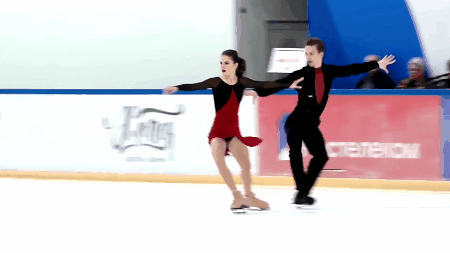

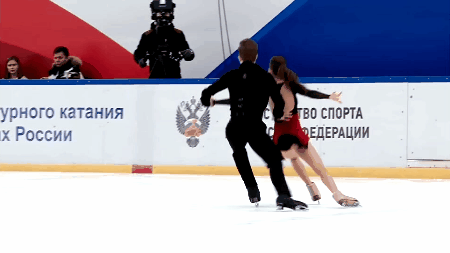
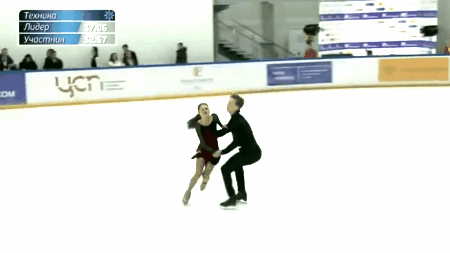
rhythm dance || 2018-19
#this tango slapped hard#still one of my all time faves#sofia shevchenko#igor eremenko#gifs#season:1819#program#2019 russian junior nationals#my gifs
11 notes
·
View notes
Photo

Kirill Iakovlev's Pirates of the Caribbean costume at the 2019 Junior Russian Nationals.
(Source: veravalenta)
#Kirill Iakovlev#Russia#Pirates of the Caribbean#Hans Zimmer#Figure skating#Men#2018–2019#2019 Junior Russian Nationals
3 notes
·
View notes
Text
An update from my latest deep dive into youtube has yielded. I haven’t watched any of it yet (i have a to watch list) so can’t really comment on any of it yet for content.
2019 -
Asian Championships
Aurora Games
2018 -
Looks like we lost the 2018 Commonwealth Games vault final which was the only part of that competition we have. It’s a good time to point out again that the Commonwealth Games are incredibly aggressive only behind the Olympics about striking videos. If you haven’t watched the current year competition yet and you want to you should make it a priority.
Added the 2018 Asian Games UB Final. Don’t have anything else from this.
CBC version of the 2018 Worlds AA
2017 -
South East Asian Games EF
The Chinese National Games
The CBC version of the Worlds AA. Or in other words the Ellie Black is Really Nifty version.
2015 -
South East Asian Games
The CBC versions of the World TF and World AA
2014 -
Asian Games UB Final
CBC version of the Worlds AA
2013 -
The Chinese National Games
2009 -
The Chinese National Games
2008 -
The BBC version of the Euros TF (and the FX final). Can’t wait to hear how they react to the worst camera angles for gymnastics ever.
2006 -
The Beam Final from the Asian Championships... (not to be confused with the Asian Games)
Qatari (no commentary) coverage of the WAG TF from the Asian Games.
2005 -
The Australian version of the Worlds AA. This makes the fifth version of this final I have and that kind of amuses me (the other four are BBC, Eurosport, WCSN/American, and Spanish).
The Chinese National Games... and I mean a LOT of it. It’s broken in parts so it’s missing at least one bit of one sub from qualification but otherwise it’s largely complete with qualification, team final, AA, and EFs.
2004 -
A little over half of Athens qualification (2 full subs, half of another though nothing from the American sub), a bit of the Athens team final from the BBC, 3 rotations of the AA from the BBC, and the entire AA from Brazilian TV.
Unfortunately it looks like the only copy of the Athens FX EF was nuked. In trying to see if there was any other version of it still on youtube I found some partial coverage from NBC and have put it in it’s place. It’s not ideal but I really can’t tell you how much building an olympics from youtube coverage can be a bit like filling the holes in swiss cheese.
2003 -
Universiade Team Final
A full length no commentary version of the Worlds TF ... but it is deeply potato.
2002 -
Asian Games AA - I don’t know how I missed this one the first time because i grabbed the team final and event finals from the same source.
2001 -
East Asian Games AA
2000 -
The English Eurosport version of the Euros EFs. Previously I had a version in French only.
Canadian junior and senior championships. This is video from the stands which I often pass on but I make exceptions and non-US championships is often something I’ll go with if it seems complete which this does.
Canadian Olympic Trials (from the CBC).
The Australian version of the Olympic TF.
1999 -
Russian Cup
1998 -
English Eurosport coverage of the Euros EFs
Japanese (I think) coverage of the Asian Games.
1997 -
French Eurosport coverage of the European Masters of Gymnastics. I had the ABC version of this before but that is 30 minutes long and this version is almost 3 hours long. Ahh editing to fit a time slot. The European Masters of Gymnastics is a now defunct meet format that involved teams of WAG/MAG/RG not unlike USAG’s 3 on 3 but... also so much more complicated.
The East Asian Games.
1992 -
Two versions of the Worlds semi finals (both are Eurosport so likely only differ in commentary one in english and one in I believe dutch). Canadian Olympic Trials. The Spanish version of the Olympic AA final.
1991 -
The ABC version of the European Cup AA. Because why not edit a 2 hour AA down to half an hour? At least it’s Bart and Kathy.
The CBC version of the Worlds AA.
1985 -
The Eurosport version of the 1985 Worlds EF and a more complete version of the 1985 Worlds EF from ABC (it has Fahnrich’s bars but you know how cares about showing the vault final...)
1982 -
Asian Games Team Final
1980 -
21 minutes of the Moscow AA with Japanese commentary. It’s in 3 parts but I suspect that is all of that one since that is about the length the sometimes would edit down an AA.
1976 -
8 of 10 parts of the Olympic AA. As is the general rule if something was uploaded in a million parts more than a decade ago some amount of it is missing.
0 notes
Photo


Viktoria Listunova’s opening pass on floor during Day 1 of the 2019 Russian Junior National Championships
129 notes
·
View notes
Photo




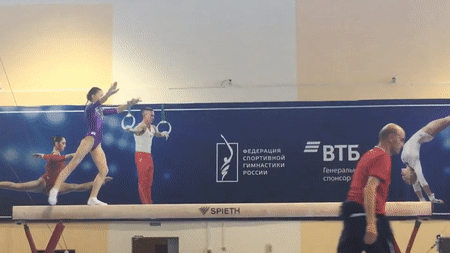

Vladislava Urazova | 2019 Russian Junior Nationals
107 notes
·
View notes
Photo

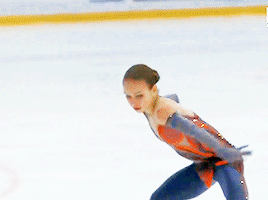


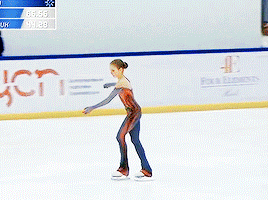
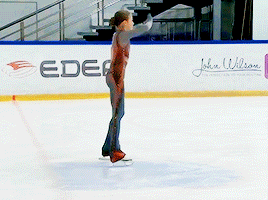
Alexandra Trusova, FS The Fifth Element || Russian Junior Nationals 2019
#alexandra trusova#fskateedit#russian junior nationals 2019#rus jr nats 2019#damn seventh into first#!#glad she went with quad toes instead of lutzes!
166 notes
·
View notes
Photo

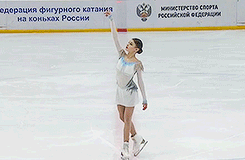



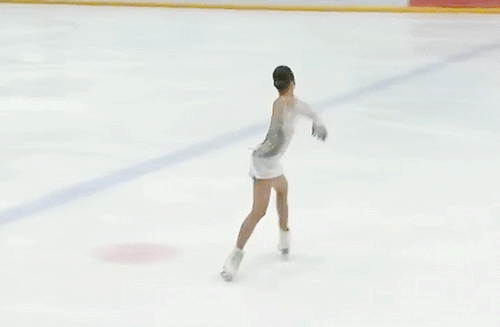
Alena Kostornaia, Russian Junior Nationals 2019
↳ SP: 79.97 (43.80 TES, 36.17 PCS), 1st place
166 notes
·
View notes